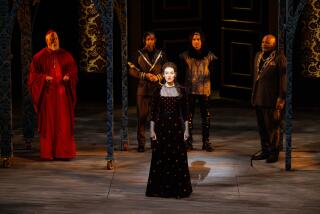Q&A: Damian Lewis, king of PBS’ ‘Wolf Hall,’ talks of a TV reign
- Share via
Damian Lewis is the king in PBS’ “Wolf Hall,” but he’s not the star. After meeting his demise as Brody on Showtime’s “Homeland,” the 44-year-old English actor is getting the royal treatment and suiting up in opulent garb to play famous and often misportrayed Tudor tyrant Henry VIII.
But Lewis’ Henry is merely a supporting player in the six-part “Masterpiece” miniseries. Based on Hilary Mantel’s novels, the series aims its focus on the savvy Tudor advisor and fixer to the king, Thomas Cromwell (played by leading stage actor Mark Rylance). “Wolf Hall” begins its PBS rollout on April 5.
It’s quite a time to be an actor on TV, wouldn’t you say? There’s broadcast, cable, digital…
Oh, yeah. A lot has happened in the last 10 years, heck, just the last three years. I am the first to say that I’ve benefited enormously from it. I came of age as a male lead actor just as the TV landscape dramatically shifted.
I didn’t know “Homeland” was going to be “Homeland.” I just did it because it was a terrific script and they pitched me the story line and I was like, “huh, that’s interesting.” And I knew who was going to be involved with it — an A-list of terrific people. As long as you keep doing that, there’s a chance that it might become a “Homeland.”
Then the drawback is, after doing a show like that, all eyes are on you on what you do next.
Oh, definitely. People are saying, “Oh, Henry VIII, interesting choice to shake the Brody image.” I’m like, “this is not a strategy, this is an accident.” I did three other things before I did “Wolf Hall,” it’s just that this is coming first. There’s this sort of cloud that hangs where people are like: “How long can you keep the heat of ‘Homeland’ going?” People have short memories is the truth, and Hollywood loves the new and shiny.
Does it feel like, especially in today’s environment, you have to constantly be doing something to stay relevant?
Sometimes. I mean, you don’t want to become a hamster on a wheel. You don’t want to be running, running, running, just to stand still. Of course it’s a nice thing to be relevant, to be in something that people are talking about. It’s such an overused phrase: “to be part of the conversation.” But it’s true. It is nice to be part of the conversation, just be sure they are talking about you in the right way.
For years, you played a character who was in this sort of web of political intrigue. Now you’re playing a character at the throne — and if ever there were a web of political intrigue, it’d be Henry VIII’s court.
Tell me about it. It’s interesting. What was more of interest was him, the man. He is a changeable, volatile, very likable on many levels, brilliant, passionate man, who became increasingly fixated and paranoid on a single issue and a lot of people died as a result of it. So his trajectory is extraordinary. He’s as complex as Brody. Interestingly, this Henry VIII is a little bit more on the periphery of his own story.
Yeah, you don’t appear until about the 40-minute mark of the first episode.
And it’ll be the same in the other episodes. He drops in. He’s a supporting role in this series. But that also allows what’s interesting — and it gives us an opportunity to see Cromwell and explore these other characters who we all know lay murkily in the background of Henry’s story, but now we get to see them up close.
It’s a bit like we get the 20 greatest hits of Henry’s emotional mood changes. We see him tender and playing a lute and composing a song, we see him losing his ... at Cromwell, we see him on a horse, we see him laughing, we see him being a father and loving. I was like, ‘Wow, we may never have seen him quite as well-rounded as this.” Because he’s not there all the time, these moments register very strongly. They’re little crystallized moments.
We are so used to the sweeping tales and his interesting quirks.
Right. He doesn’t chew one drumstick in this and throw it over his shoulder. It’s a different Henry. He uses a knife and a fork. And a napkin, for goodness’ sake.
I feel a sense of disappointment in your body language.
I don’t hide it well, do I? No, but everyone was like, “Oh, are you going to wear a fat suit?” The truth is, toward the end of this series, I do start to bulk up a bit with padding. But one of the fascinating things that I discovered about Henry is that into his 40s, he was a 32-, 34-inch waist. He was a dynamic, talented sportsman. He was svelte and athletic. He was tall and broad-shouldered. He was a bit of a movie star, and people wrote about him that way.
He was broader than me, a bit more barrel-chested. Had big legs, had calf bones that he showed everyone like a 12-year-old. That’s another thing I loved about him, his boyish enthusiasm. He’d be like, “My calves are better than yours.” He did actually say that to the king of France.
More to Read
The complete guide to home viewing
Get Screen Gab for everything about the TV shows and streaming movies everyone’s talking about.
You may occasionally receive promotional content from the Los Angeles Times.







